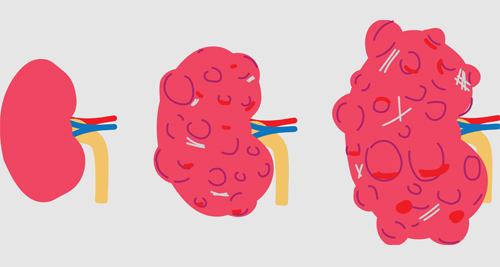Autosomal Dominant Polycystic Kidney Disease (ADPKD) Overview
Autosomal Dominant Polycystic Kidney Disease (ADPKD) is a common inherited condition where clusters of fluid-filled sacs — or cysts — develop in the kidneys. These cysts grow over time, often leading to enlarged kidneys, reduced kidney function, and eventually kidney failure. As the name suggests, ADPKD follows an autosomal dominant pattern. This means a child has a 50% chance of inheriting the condition if one parent is affected.
4o mini.
The condition affects both kidneys, but one may be more severely impacted than the other. People with ADPKD often remain asymptomatic for decades, with symptoms usually beginning between the ages of 30 and 50. However, early signs can appear in childhood or adolescence, especially in cases where the disease progresses more rapidly.
Common symptoms include:
- High blood pressure (often the first detectable issue)
- Pain or heaviness in the abdomen, sides, or lower back
- Blood in the urine (haematuria)
- Frequent kidney infections or urinary tract infections
- Kidney stones
- Fatigue or feeling unwell due to declining kidney function
In South Africa, many people go undiagnosed for years due to limited access to routine imaging like ultrasounds or CT scans in certain communities. Doctors often discover ADPKD during investigations for hypertension or abdominal pain.
Autosomal Dominant Polycystic Kidney Disease
ADPKD doesn’t only affect the kidneys. Some people also develop cysts in the liver, aneurysms in the brain, or heart valve abnormalities, making regular monitoring essential. Despite these challenges, many individuals live well for decades with careful medical supervision, lifestyle adjustments, and — when needed — dialysis or transplantation.
Managing ADPKD Through Early Diagnosis and Monitoring
In conclusion, early diagnosis and regular monitoring of ADPKD are crucial for managing the disease and improving quality of life. With appropriate interventions—such as blood pressure control, pain management, and regular imaging—doctors can slow the progression of kidney damage. Although ADPKD is a lifelong condition with no cure, many individuals with proper care can live well into their later years without reaching kidney failure. The key is staying vigilant and maintaining regular check-ups to catch complications early.
The Importance of Genetic Awareness and Family Planning
Understanding the genetic nature of ADPKD is vital for affected individuals and their families. Knowing one’s family history and undergoing genetic testing can help inform decisions about family planning and early screening. In South Africa, where access to healthcare may be limited, people must raise awareness about the condition. They must also improve access to genetic counseling and diagnostic tools. With advancements in genetic research and potential new therapies, there is hope for better management and treatment options for future generations.
👉 [Next: Causes and Genetics of ADPKD]
Autosomal Recessive Polycystic Kidney Disease (ARPKD) Overview


